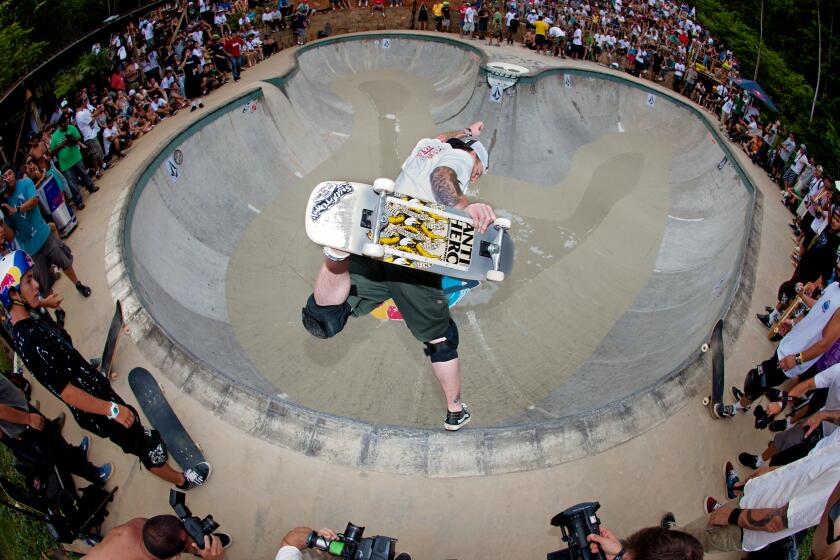Who was Jeff Grosso? A primer on the skateboarding legend

- Share via
For decades, Jeff Grosso lived and breathed skateboarding, spreading his passion for the sport in person and in his digital series “Loveletters to Skateboarding.” His friends and family recall his passion, his character and what made him a skateboarding legend.
Almost a year after his death, here is a primer on his influential life:
How good was Jeff Grosso?
A Southern California native born in 1968, Grosso became one of the top professional skateboarders during the sport’s popularity boom in the late 1980s. He turned pro in 1986, at only 17 years old. He competed in events around the world, recognized as one of the stars of skateboarding’s “vertical” style — defined by half-pipes, empty swimming pools and aerial tricks.
Grosso was never considered the top competitor in skateboarding during that time, lagging behind Tony Hawk, Christian Hosoi and a few others. But he was one of the most popular, in large part because his personal form — which featured fewer gravity-defying big air tricks, but perfected technique on skills any amateur skater could try on their own — much more closely mimicked what skaters around the country would see at their own local skatepark.
His career didn’t last, though, flaming out at the end of the decade as street style skating — a discipline where tricks are performed off urban obstacles such as staircases, benches and handrails — became the most popular form of skateboarding in the early ’90s.
Few people outside of the skateboarding world knew of Jeff Grosso before his death a year ago of a drug overdose. Yet few led as influential a life.
What happened after his pro career?
Like many other skaters of his generation, Grosso struggled with addiction and depression during the ’90s. He had a heavy drinking problem, then began using methamphetamine and heroin. Three times, he was rushed to the hospital without any vital signs after overdosing. At least twice, as he described in interviews later in his life, he intentionally tried to overdose.
But in 1997, he began a rehab process. Though it took eight years before he finally achieved sobriety, he talked about his struggles openly in a way that resonated with others in the sport battling the same issues.
In 2011, he began hosting the “Loveletters to Skateboarding” series, a collection of mini-documentaries designed as on-camera tributes to various topics in the sport’s history and culture.
He became a familiar face at skating events during the sport’s popularity boom over the past two decades, rekindling old friendships and building new connections with the newest generation of competitors.
And he became a dad to his son, Oliver, who made frequent appearances on his YouTube show and was the first topic Grosso would want to talk about when catching up with friends.
How did he die?
Grosso died unexpectedly March 31, 2020, after being rushed to Hoag Hospital in Newport Beach in cardiac arrest. The Orange County Sheriff-Coroner’s office later determined his cause of death as acute polydrug intoxication due to the combined effects of fentanyl and phenobarbital. His death was ruled an accident.
It’s unclear how the phenobarbital, a barbiturate often used to treat seizures and anxiety, or fentanyl, a powerful synthetic opioid similar to morphine but 50 to 100 times more potent, got in Grosso’s system. Fentanyl, which has become one of the leading culprits in drug-caused deaths over the last five years in the Los Angeles area and other parts of the country, is often present in counterfeit pills.
Despite the manner of his death — one of several drug-related deaths that have rocked the skateboarding world in recent years — friends are adamant that Grosso hadn’t reverted to the destructive habits that derailed his life decades earlier.
The sport mourned his passing. Hawk called him “a big reason that anyone truly cares” about skateboarding. And Vans hosted a virtual memorial including some of skateboarding’s other biggest stars, all describing why Grosso — despite his short pro career and the many ups and downs in his life — was such a crucial voice in their sport.
More to Read
Go beyond the scoreboard
Get the latest on L.A.'s teams in the daily Sports Report newsletter.
You may occasionally receive promotional content from the Los Angeles Times.












